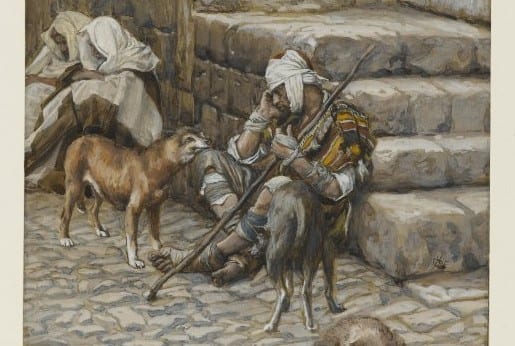
A Reading from the Holy Gospel according to Luke:
Jesus said to the Pharisees:
“There was a rich man who dressed in purple garments and fine linen
and dined sumptuously each day.
And lying at his door was a poor man named Lazarus, covered with sores,
who would gladly have eaten his fill of the scraps
that fell from the rich man’s table.
Dogs even used to come and lick his sores.
When the poor man died,
he was carried away by angels to the bosom of Abraham.
The rich man also died and was buried,
and from the netherworld, where he was in torment,
he raised his eyes and saw Abraham far off
and Lazarus at his side.
And he cried out, ‘Father Abraham, have pity on me.
Send Lazarus to dip the tip of his finger in water and cool my tongue,
for I am suffering torment in these flames.’
Abraham replied,
‘My child, remember that you received
what was good during your lifetime
while Lazarus likewise received what was bad;
but now he is comforted here, whereas you are tormented.
Moreover, between us and you a great chasm is established
to prevent anyone from crossing who might wish to go
from our side to yours or from your side to ours.’
He said, ‘Then I beg you, father,
send him to my father’s house, for I have five brothers,
so that he may warn them,
lest they too come to this place of torment.’
But Abraham replied, ‘They have Moses and the prophets.
Let them listen to them.’
He said, ‘Oh no, father Abraham,
but if someone from the dead goes to them, they will repent.’
Then Abraham said, ‘If they will not listen to Moses and the prophets,
neither will they be persuaded if someone should rise from the dead.'”
The poor man’s name was Lazarus.
I don’t know how that name rings on other people’s ears. I grew up in Columbus, where “Lazarus” was the name of a department store, the pride of the city in its prime. There was one location with bright aqua tile on the facade, and one location downtown that had fanciful displays in the windows at Christmas. I used to get a brand new Christmas teddy bear from Lazarus every year, all decked out in a unique red sweater and hat. “Lazarus” reminds me of Christmas. Of course, it turns out that the name has nothing to do with Christmas– it was the surname of the gentleman who founded the department store, a rabbi and an immigrant from Germany, may his memory be a blessing– but it remains a name that’s hard to forget. It doesn’t take long to think of “Lazarus.” “Lazarus” is a memorable name.
“Lazarus” itself is both a given name and a surname, derived from the name “Eleazar,” which means “God helps.” Eleazar was the name of the keeper of the ark of the covenant, one of King David’s warriors, one of the men responsible for the sacred vessels at the return from the Babylonian exile, the man Christ wept for and raised from the dead, and also a fictional character in one of Christ’s parables. In life, this Eleazar, Lazarus, was a poor man covered in sores, hungry for scraps, licked by dogs; in paradise, he was embraced in the bosom of Abraham his ancestor.
The rich man in the parable is not named at all. Some re-tellings of the story call him “Dives,” but that’s not a name; it’s just a word that means “rich man.”
There was a rich man named Rich Man, and we know nothing about him except for the things he possessed and the ways he enjoyed himself. He dressed in purple and fine linen, and dined sumptuously every day. Meanwhile, lying at his door, was a man named Lazarus, Eleazar, God Helps. And Lazarus was not only ill but starving.
The man whose name was Rich Man must have stepped over Lazarus at least twice every day, once on his way out and once on the way back home. Once when going out shopping for new linen clothing and once when coming home to feast. Once when going out to the synagogue, perhaps, and once on the way in to celebrate the Sabbath. Once on his way out to see to his investments, his vineyards or cattle or merchandise or whatever it is that made the rich man rich. Once on his way back to enjoy the things he bought with the money he earned, his just reward for his work and prudent investment. Each time, he stepped over Lazarus, a fellow child of Abraham.
He must have noticed Lazarus lying there at the door with dogs licking him, starving, probably reeking to high heaven.
Perhaps he thought he was generous, allowing his sick and hungry neighbor to take shelter in his doorway. Perhaps he prayed for him as he went in and out, and thought this was generous as well. “God help him.”
“Lazarus” means “God helps.”
For this, the rich man’s soul was eternally lost.
Christ doesn’t speak very often in the gospels about the torments of Hell, but he mentions them here. For the crime of never stopping to help his neighbor, the rich man was cast into the netherworld. And he looked up from the flames and saw Abraham standing there, with the man called Lazarus resting on Abraham’s bosom, because Heaven isn’t really removed from Hell. Heaven is the love of God, which is everywhere present and filling all things. There’s no getting away from that. The torment of hell is being a soul that insisted on a there being a gulf between things that ought to be close together– between neighbor and neighbor, between person and person, between icon and icon– between your state in life and the state of the reeking beggar at your door. Hell is the state of having fought as hard as you can to open up an abscess between yourself and the person God sent to you, and now you have to live on one side of that abscess you willingly made. And there, afar off, on the other side of the abscess, is your neighbor in Abraham’s bosom.
There is the man called Lazarus, who was himself covered in abscesses that the rich man could have helped to bandage but didn’t. Lazarus is loved and comforted by angels and resting in his ancestor’s embrace. The angels know his name. Abraham knows, and uses it.
The rich man has no name.
In life, the rich man insulated himself with luxury and pleasure, but now he has gone to the netherworld. The netherworld is the place where your luxury and pleasure are stripped away and everyone can see you– not what you have, but who are, who you chose of your own free will to become. He chose to become a man with no name– a man with no identity, a man who wasn’t a person but an emptiness surrounded by wealth and luxury, a heap of pleasant diversions in the shape of a man. He chose to be a man whose name was “Rich Man,” but now the man called “Rich Man” is not rich.
Even the rich man in hell knows Lazarus’s name, but he won’t address Lazarus. In life, he did not speak to Lazarus, and he doesn’t speak to him now. He speaks to their shared ancestor, the righteous Abraham. He begs Abraham to send Lazarus to hell to serve him a drink. The rich man is used to being served. He is used to having is discomfort soothed by people he considers less than he is. But in the eyes of Heaven there is no such thing as a man who is less.
Abraham is tender, and addresses the rich man as “my son.” He loves the rich man, but there’s nothing he can do. Between the netherworld and Abraham’s bosom there is a gulf that can never be crossed, because the souls in the netherworld wish it to be so. The souls in the netherworld opened up the abscess between brother and brother, and they maintain it for eternity because they want to even though it hurts. Lazarus cannot cross that. Abraham himself cannot cross that. Nobody can.
The rich man bargains. He’s used to bargaining to get what he wants. There has to be a way. Will Abraham at least send Lazarus back to the world where he was tormented and despised, as a favor, to warn the rich man’s brothers?
No, Abraham cannot. That world murdered Lazarus by neglect, and there is no getting him back now. Besides, it would do no good. They will not listen to the Law and the Prophets; they’re not going to listen to a man they thought was so much less than they, not even if he returns from the dead.
“Lazarus” is a memorable name, and the Lord granted him eternal memory. But the name of the rich is “Rich Man.” The name of the rich is “Pleasure.” The name of the rich is “Prestige.” The name of the rich is “Luxury.” The name of the rich is “Better-than-Thou.” These are names that do not go with you into the next life.
The names of the rich are forgotten.
(image via Wikimedia Commons)
Steel Magnificat runs almost entirely on tips. To tip the author, go here.













